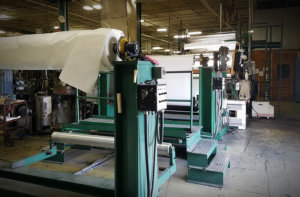Industrial Laminating Film: Serving Your Processing Needs

If you aren’t familiar with the laminating process or the products used within that process, we’re here to help. Industrial lamination is quite different from the type of lamination you may have witnessed in the past. But with a bit of an explanation, we can ensure that you not only know how industrial lamination works, but exactly how you can take advantage of it as a business owner.
What Is Industrial Lamination and Industrial Laminating Film?
What is industrial lamination, and how is it differentiated from standard lamination? Industrial lamination works through the use of industrial laminating machines, otherwise known as industrial laminators. These machines use industrial laminating film to seal products—primarily documents, though we can ostensibly feed other products into laminating machines. While a typical laminating procedure will involve industrial laminating film, on occasion a laminator will utilize foil, or even paper. No matter what material you use, the roll employed must be at least two-ply.
There are three different approaches to the industrial lamination process. They depend on the bonding of the lamination, which can be wet-bond, dry-bond, or thermally bonded. Oil and water heating systems are often used during industrial lamination, and spreader rolls and colling may also be utilized. Through the employment of heat, an industrial laminator can ensure the protection of products.
There will only be more of a demand for industrial laminators and industrial laminating film as the market expands. The industries that require industrial lamination in particular include medical and automotive industries, though they certainly aren’t alone in this sense. Projections indicate that the demand for industrial lamination is rising from the advertising and photography sectors in the future. This suggests an increased distribution of industrial laminators. In turn, the machines will likely become more automated. Until industrial laminators reach that point, however, you may find them difficult to use.
This is where contractor manufacturers step in. You are under no obligation to handle your industrial lamination in-house. While it may be tempting to do so, you may actually save time, money, and manpower by handing the process off to a third party manufacturer.
How Can Conversion Technologies International Assist You With Industrial Lamination?
There are many ways in which CTI can assist you with your industrial lamination needs. As a contract manufacturer, CTI essentially acts as a third party, laminating products for you following an order. You as the client are able to specify how much you need, what materials you would like used, and exactly what types of products we must laminate. In some cases, you may also supply the materials that you would like used in the laminating process. This, however, would be toll manufacturing rather than contract manufacturing.
What can CTI offer in terms of industrial lamination? Some of the products that we’ve laminated include:
- Documents
- Textiles
- Construction materials
- Signs
- Product packaging
The benefits of outsourcing your industrial lamination needs include cutting costs (especially in the early days of your business, or during a pilot program) and needs. While you would need to buy your own industrial laminating machines if you laminated products in-house, this is not necessary when working with CTI. We handle the processes to your specifications.
Additionally, CTI does offer industrial roll laminating, which can be more difficult to source than standard industrial lamination. Furthermore, CTI offers a variety of different substrates and types of industrial laminating film. This flexibility is key to our process, and is one of the reasons why so many businesses utilize CTI for research and development purposes.
How Can CTI Help You Test Products?
In some cases, particularly in those involving lamination, a bit of experimentation is required. You may not necessarily know how effectively a product can be laminated, or what specific type of lamination will fit the order. CTI can help you through this experimentation process, evaluating the materials that you wish used before applying them. Additionally, we can ensure that you are using the optimal equipment.
Perhaps one of the greatest advantages of working with CTI rather than laminating in-house is that we allow you the freedom to test your marketplace. You can’t always be certain about your products’ reception. When testing the marketplace, you will naturally need to make alterations depending on the response of your consumers. By working with CTI, you can make these experimental orders and alter production as needed. We can make the accommodations and changes as they come, and for that matter can help ensure that your product is the best that it can be before it hits the marketplace. If you want our suggestions for improvements, we are certainly happy to offer feedback.
You don’t have to commit to working with us immediately. Consult with CTI, and we’ll determine if we are the best fit for your industrial lamination needs. The great thing about working with an experienced contract manufacturer is that the process can be as removed or as collaborative as you would prefer. Give us a call at 419-924-5566 or contact us here. We’re ready to discuss your options!
- << < Previous Post
- 1
- 2
- ...
- 75
- ...
- 241
- 242 Next Post > >>

